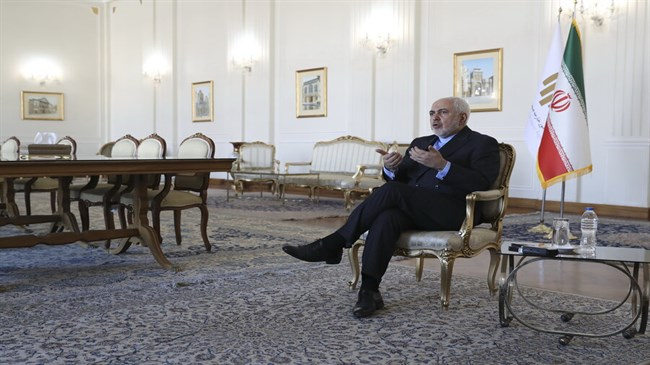Zarif warns US over 'dangerous' delay in undoing wrongs

ran’s Foreign Minister Mohammad Javad Zarif criticized the administration of US President Joe Biden for not moving fast to rectify wrong steps taken under former president Donald Trump.
“The more they hesitate, the more the US will lose,” Mohammad Javad Zarif said in an interview with the Iranian daily Hamshahri published on Saturday.
Zarif said the delay will harm the Biden administration’s image and that it will show that they do not want to save themselves from Trump’s failed policy toward Iran, Press TV reported.
“I don’t think that’s the image Mr. Biden wants to show of himself,” he added.
Despite Biden's pledge to return to the path of diplomacy, Iran is losing patience with his administration's recent signals to retain sanctions on the Islamic Republic as a bargaining chip for now.
The continuation of the pre-existing conditions will show to the world that the new US administration has not distanced itself from its predecessor “and that’s dangerous for the US,” the foreign minister said.
He called on Biden to immediately fix the wreak of a foreign policy that Trump left behind as he left office on January 20.
Biden, who was vice president when the nuclear deal was clinched in 2015, has promised to reenter the accord. Iran, on the other side, insists on the immediate removal of sanctions, without which, it says, the US return to the deal would be meaningless.
In May 2018, Trump pulled the US out of the Iran nuclear deal, formally known as the JCPOA, and restored tough sanctions as part of his “maximum pressure” campaign against the Islamic Republic.
Regarding the US withdrawal, Zarif said the US failed in its JCPOA test but the deal is still in place.
“[The US] can now get a ticket back to the JCPOA by honoring its commitments and coming to the JCPOA table and showing with an appropriate conduct that it is a worthy party for dialogue,” he said.
Only then, he continued, Iran would be able to reevaluate the matter.
Asked whether the US and other parties to the deal – the UK, France, Germany, China and Russia – can misuse the dispute resolution mechanism enshrined in the JCPOA once the US returns to the deal, Zarif said the triggering of the mechanism is a two-way process that has not been exploited so far.
“In other words, Iran can revive its [nuclear] program – as it did – in the face of the other side’s violation [of its JCPOA commitments], and the other side can also take us to the Security Council in case of a violation by Iran,” the chief Iranian diplomat explained.
Late in August 2020, the Trump administration announced that it has triggered the dispute resolution mechanism against Iran in spite of the fact that it was no longer a party to the deal.
The move was flatly rejected by almost all UN Security Council members, and turned into one of the most iconic defeats of the Trump administration against Iran.
Zarif also emphasized that Iran’s reduction of its nuclear commitments, which began in May 2019, was a reaction to the other parties’ failure to honor their JCPOA commitments, and therefore, it cannot be used as a basis for triggering the dispute resolution mechanism.
“We are now taking compensatory measures,” Zarif noted. “We did not sign the JCPOA only to break it. We will stop our compensatory measures as soon as they return to the JCPOA.”
Zarif said in the event that the other side tries to exploit the dispute resolution mechanism and puts it forward in the Security Council, Iran for its part would use the nuclear Non-Proliferation Treaty (NPT)’s provisions to withdraw from it.
“We have made it clear in the negotiations as well as in the agreement that Iran would abandon its commitments,” he added.
Iran’s hands always extended for peace
The Iranian foreign minister was asked to comment on recent remarks by his Saudi counterpart Faisal bin Farhan Al Saud, who said “our hands are outstretched for peace with Iran, but it does not commit itself to agreements”.
Zarif stressed that Iran’s hands have always been outstretched for peace. “Then, why aren’t these two hands reaching one another?” Zarif asked.
He also said the Saudis have inflicted great harm on Iran on a number of occasions, including during the former Iraqi dictator Saddam Hussein’s invasion of Iran in the 1980s when Riyadh propped up Saddam against the Islamic Republic, and recently when Riyadh resorted to the apartheid Israeli regime to counter Iran.
“That’s a hollow [extension of] hands,” he said, adding, however, that Iran is still open to peace efforts and has several proposals in this regard.
Source: Iran Daily

